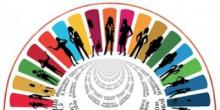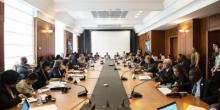HLPF 2019 | General Debate
General Debate of the High-Level Political Forum
STATEMENT OF THE INTERNATIONAL DEVELOPMENT LAW ORGANIZATION
United Nations Headquarters, New York
Delivered by Mr. Patrizio Civili, Permanent Observer, IDLO


IDLO and the United Nations' 2030 Agenda for Sustainable Development
Building institutions for peace and justice, strengthening accountability, empowering women and girls, fighting corruption, protecting biodiversity and promoting inclusive economic growth are just a few examples of the ways in which IDLO’s programs and other activities further the implementation of the SDGs.
The principles of the rule of law – equality, equity, inclusion, rights, laws and strong institutions – are embedded throughout the United Nations 2030 Agenda for Sustainable Development, and especially Sustainable Development Goal (SDG) 16, which aims to “promote peaceful and inclusive societies for sustainable development, provide access to justice for all and build effective, accountable and inclusive institutions at all levels”. Goal 16 is not isolated in objective, and in fact, IDLO programs have demonstrated how it drives the success of other SDGs.
IDLO’s Strategy 2020 is inspired by the vision of the 2030 Agenda and its goals of advancing access to justice, combating inequalities and promoting social inclusion. IDLO has long been a champion of the rule of law as both an outcome and enabler of sustainable development. As a strong advocate for the inclusion of Goal 16 in the 2030 Agenda, IDLO is fully committed to advancing the SDGs.
The rule of law is relevant to all three dimensions of sustainable development: economic, social and environmental. By providing stable and transparent legal regimes, the rule of law encourages economic development. By ensuring equal opportunity and equitable access to basic services, it promotes social development. By strengthening the laws to protect the environment and ensure proper management of natural resources, it ensures environmental sustainability.
IDLO continues to foster debates and dialogue at the national and international levels on Agenda 2030, focusing specifically on equality, inclusion and access to justice. IDLO’s presence in New York, Geneva, Rome and The Hague harnesses strategic international platforms such as the High-Level Political Forum in New York, the UN Human Rights Council in Geneva, and the United Nations Committee on Food Security in Rome to give a multiplier effect to its policy advocacy.
Whether in fragile contexts, emerging democracies or middle-income countries, IDLO contributes to the 2030 Agenda through its programs, research and policy advocacy, positioning the rule of law as a key ingredient for sustaining peace, fostering development and building just and inclusive societies.

The consultations on, and final form of, what has become known as the 2030 Agenda have made one thing clear: the imperatives of inclusivity, equity and justice are central to the global pursuit for sustainable development. The space for a genuine dialogue about human rights and democratic governance has opened up. View More
General Debate of the High-Level Political Forum
STATEMENT OF THE INTERNATIONAL DEVELOPMENT LAW ORGANIZATION
United Nations Headquarters, New York
Delivered by Mr. Patrizio Civili, Permanent Observer, IDLO

Until recently, court processes in the Kyrgyz Republic have not been automated. Manual or paper systems still are required and are the norm although automating all processes has started very actively. According the country’s National Target Program for Development of the Judiciary, automated information systems need to be expanded and rolled out to the whole judicial system, not only within all first instance courts, but also second and third instance courts.
NEW YORK — Sustainable Development Goal 16, aimed at achieving peaceful, inclusive societies and access to justice for all by 2030, remains far off-track for completion by the target date of 2030.
Side event on Advancing the Role of Women in Peace, Justice and Strong Institutions

Review of SDG implementation and interrelations among goals: Discussion on SDG 16 – Peace, justice and strong institutions
Roundtable on: Sustainable Development through Access to Justice and the Rule of Law
Following up on the Rome Conference Discussion on SDG16.3 and Beyond

The High-Level Political Forum is the main United Nations platform on sustainable development and it has a central role in the follow-up and review of the 2030 Agenda for Sustainable Development and the Sustainable Development Goals (SDGs) at the global level.

Meru County in Kenya became the first to adopt a county-level policy on sexual and gender-based violence (SGBV). Approved in April 2019 and launched on June 26, 2019, the Meru County Policy on SGBV aims to close the gap between provisions in national legislation and the lived experience of SGBV survivors.

Justice Albie Sachs, former judge on South Africa’s Constitutional Court and current member of IDLO’s International Advisory Council, has spent his lifetime fighting for freedom and equality.


|
Policy Statements
|
|
Policy Statements
|